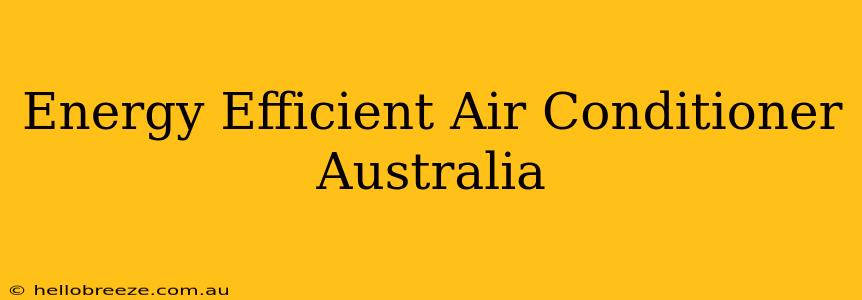Australia's summers are notoriously hot, making air conditioning a necessity for many homes and businesses. However, running an air conditioner can significantly impact your energy bills. Choosing an energy-efficient air conditioner is crucial for both your comfort and your wallet. This guide explores the factors to consider when buying an energy-efficient air conditioner in Australia, helping you stay cool while reducing your environmental footprint.
Understanding Energy Efficiency Ratings in Australia
Before you start shopping, understanding the energy efficiency rating system is paramount. In Australia, air conditioners are rated using the National Energy Rating (NER) system. This system uses a star rating, with more stars indicating higher energy efficiency. A higher NER rating means the air conditioner uses less energy to achieve the same cooling power, leading to lower electricity bills. Look for air conditioners with a high NER rating (5 stars or more) to maximize your savings.
Key Factors Affecting Energy Efficiency:
- SEER Rating (Seasonal Energy Efficiency Ratio): This measures the cooling output over an entire season relative to the energy consumed. A higher SEER rating indicates greater energy efficiency.
- EER Rating (Energy Efficiency Ratio): This measures the cooling output at a specific point in time relative to the energy consumed. While useful, SEER provides a more comprehensive picture of long-term efficiency.
- Inverter Technology: Inverter air conditioners adjust their compressor speed to maintain the desired temperature, using less energy than traditional on/off models. Inverter technology is a significant factor in achieving higher energy efficiency.
Types of Energy-Efficient Air Conditioners
The Australian market offers various energy-efficient air conditioning options to suit different needs and budgets:
1. Split System Air Conditioners:
These are the most common type, consisting of an indoor and outdoor unit. Split systems are known for their high energy efficiency and precise temperature control. They are suitable for individual rooms or zones.
2. Multi-Split System Air Conditioners:
Ideal for larger homes or businesses, multi-split systems use a single outdoor unit to power multiple indoor units. This offers flexibility and cost-effectiveness compared to installing several individual split systems.
3. Ducted Air Conditioning:
Ducted systems distribute cooled air throughout your entire home via a network of ducts. While generally more expensive to install, they offer consistent cooling and excellent energy efficiency when properly sized and installed.
4. Window Air Conditioners:
These are a more budget-friendly option but generally less energy-efficient than split systems. They are suitable for smaller spaces.
Tips for Maximizing Energy Efficiency
Even with an energy-efficient air conditioner, you can further reduce your energy consumption by following these simple tips:
- Regular Maintenance: Schedule regular servicing to ensure your air conditioner is running at peak efficiency. Clean filters regularly and check for leaks or blockages.
- Proper Installation: Ensure your air conditioner is professionally installed to optimize its performance and energy efficiency.
- Optimal Temperature Setting: Setting your air conditioner a few degrees higher can make a big difference in energy consumption.
- Strategic Placement: Position your air conditioner strategically to maximize cooling efficiency and minimize heat gain.
- Insulation and Sealing: Proper home insulation and sealing can significantly reduce the energy needed to cool your space.
- Utilize Smart Features: Many modern air conditioners offer smart features like programmable timers and remote control, allowing you to optimize energy use.
Choosing the Right Air Conditioner for Your Needs
Selecting the right energy-efficient air conditioner involves considering several factors, including:
- Your Budget: Air conditioners vary significantly in price depending on size, features, and energy efficiency.
- Your Home's Size and Layout: Proper sizing is crucial for optimal efficiency. A unit that's too small will struggle to cool your space, while a unit that's too large will waste energy.
- Your Climate: The climate in your specific region will influence the cooling capacity required.
- Your Lifestyle and Preferences: Consider features like smart controls, quiet operation, and special functions.
By carefully considering the factors outlined above and choosing an energy-efficient air conditioner with a high NER rating, you can enjoy a cool and comfortable home without breaking the bank. Remember to prioritize professional installation and regular maintenance for optimal energy savings and longevity. Stay cool, Australia!

